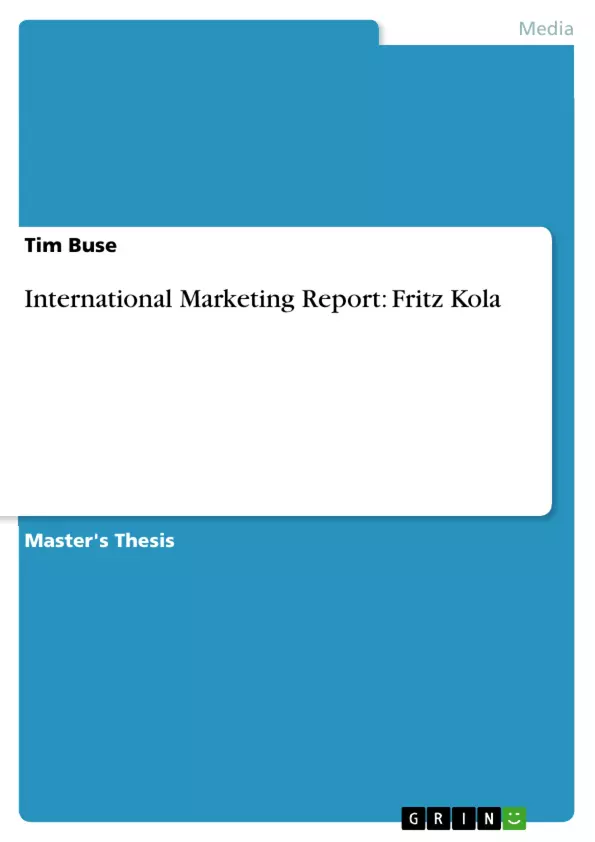The Fritz-Kola GmbH is a German enterprise founded in 2003 by Lorenz Hampl and Mirco Wolf Wiegert, two students from Hamburg. The original idea behind the product was to create a cola drink that tastes different from the products of Coca-Cola or Pepsi, being less sweet with more caffeine. Focussing on the distribution through restaurants, cafés, bars and clubs, the brand became popular among the targeted group of young individualists and party-goers. It is due to that popularity, which also was supported by the trend of supporting regional brands, that Fritz-Kola’s revenues were increasing by two over three years in a row. In 2006, the company launched other beverages like lemonades and a ‘morning-cola’ that has the taste of coffee and caramel.
By 2010, the company’s revenue was €2.7 million. The internationalization of its products is an on-going process. Today, Fritz-Kola is available in Germany, Poland, The Netherlands, Austria, Switzerland, Spain and Belgium. Fritz Kola is also available in the UK, but only in one restaurant, which is a German restaurant importing the product from Germany.
The corporate objectives of Fritz-Kola GmbH are not to become a market leader in the segment of soft drinks, but to provide a considerable alternative to the big players like Coca-Cola and PepsiCo. For that reason, the company strives to create a diversified product portfolio under the brand name Fritz-Kola, consisting of cola lemonades.
Inhaltsverzeichnis (Table of Contents)
- Fritz-Kola: The Concept
- The UK Macro Environment
- Political Factors
- Economic Factors
- Socio-economic Factors
- Technological Factors
- Environmental Factors
- The Micro Environment
- Soft Drinks Market Overview
- Consumers Trends
- Competition
- 5-Forces Analysis
- SWOT Analysis
- Strengths
- Weaknesses
- Opportunities
- Threats
- Marketing Objectives
- Build brand awareness
- Increase market penetration
- Make use of Segmentation and Targeting
- Strategy
- The Ansoff Matrix
- Porter's Generic Strategies
- Segmentation, Targeting, Positioning
- Implementation
- Product
- Price
- Place
- Promotion
- People
- Process
- Control
Zielsetzung und Themenschwerpunkte (Objectives and Key Themes)
This report aims to provide a comprehensive analysis of Fritz-Kola GmbH's potential for success in the UK market. By analyzing the UK's macro and micro environments, the report identifies key opportunities and challenges that Fritz-Kola may encounter in its quest for market penetration. The report explores the following key themes:- The UK's political, economic, social, technological, environmental, and legal (PESTLE) environment
- The competitive landscape of the UK soft drinks market
- Fritz-Kola's unique brand positioning and differentiation strategy
- The application of marketing tools such as SWOT analysis and Porter's Generic Strategies
- Implementation strategies for product, pricing, distribution, promotion, and other key marketing elements.
Zusammenfassung der Kapitel (Chapter Summaries)
The first chapter introduces Fritz-Kola GmbH, outlining its origins, core product offerings, and initial success in the German market. The company's revenue growth, diversification into new product lines, and ongoing international expansion are also highlighted. The second chapter focuses on the UK's Macro Environment, using the PESTLE framework to assess the political, economic, social, technological, environmental, and legal factors that may influence Fritz-Kola's operations in the UK. This analysis examines the UK's political stability, economic conditions, demographic trends, technological advancements, environmental concerns, and legal regulations. The third chapter delves into the UK's Micro Environment, examining the specific factors within the UK's soft drinks market that are relevant to Fritz-Kola's success. This chapter analyzes the market size, consumer trends, competitive landscape, and key industry dynamics.Schlüsselwörter (Keywords)
The report revolves around the themes of market analysis, brand positioning, competitive strategy, and marketing implementation. Key terms include PESTLE analysis, SWOT analysis, Porter's Generic Strategies, product differentiation, market segmentation, targeting, and brand awareness. The report also draws upon concepts related to the UK's soft drinks market, consumer behavior, and internationalization strategies.Frequently Asked Questions
What is the unique selling proposition (USP) of Fritz-Kola?
Fritz-Kola differentiates itself by being less sweet than major competitors, having a significantly higher caffeine content, and maintaining a regional, "indie" brand image.
What are the main marketing objectives for Fritz-Kola in the UK?
The primary goals are to build brand awareness among young individualists, increase market penetration in urban centers, and establish the brand as a credible alternative to Coca-Cola and Pepsi.
How does the UK Macro Environment affect the market entry?
Factors like political stability, economic health, and consumer trends toward healthier or premium soft drinks play a vital role in determining the success of the expansion.
Who is the target audience for Fritz-Kola?
The brand targets young adults, party-goers, and "individualists" who frequent trendy bars, cafés, and clubs and prefer non-mainstream products.
What strategy does Fritz-Kola use according to Porter's Generic Strategies?
Fritz-Kola follows a differentiation strategy, focusing on unique product attributes and brand personality rather than competing on price with mass-market leaders.
- Quote paper
- Tim Buse (Author), 2011, International Marketing Report: Fritz Kola, Munich, GRIN Verlag, https://www.grin.com/document/191334



